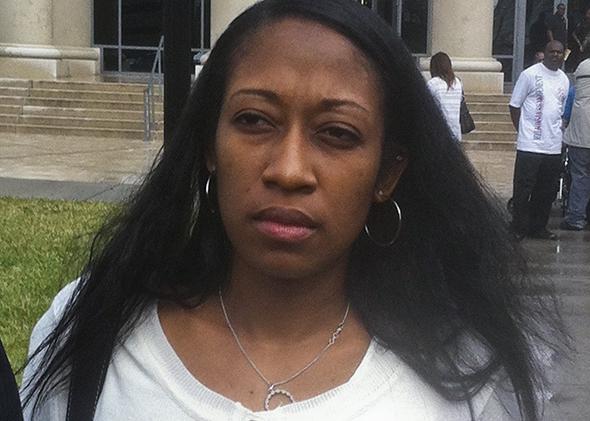Marissa Alexander, the black woman who was sentenced in Florida to 20 years in prison for firing a warning shot at a husband who was allegedly abusing her, starts her retrial in July. Except now she may be facing up to 60 years in prison if convicted again. The prosecutor announced this week that she would be seeking the maximum sentence of 20 years for three counts of aggravated assault with a deadly weapon—one for her husband and two for his children who were in the room at the time—to be served consecutively. These are the same charges she was found guilty of the first time, but the judge in that case ruled that she should serve the sentences concurrently.
Alexander’s case drew a lot of attention last year because of its unsettling contrast to a different Florida shooting trial, that of George Zimmerman, in which Zimmerman successfully argued that he had to shoot Trayvon Martin, an unarmed teenager who was running a quick errand on foot, because he felt Martin was a danger to him. Zimmerman actually killed Martin but did not get convicted, whereas Alexander did not kill anyone and has argued convincingly that she was being chased and abused by her husband in the house. Alexander is a black woman, however, and Zimmerman is not—though his victim was also black—and critics of the two cases are suggesting those race and gender differences might be carrying more weight than the actual evidence and severity of the respective crimes.
In Alexander’s original trial, the jury was instructed that she had to prove beyond a reasonable doubt that her husband, Rico Gray, had battered her. That’s why her original conviction was thrown out, as Gray wasn’t actually the person on trial and Alexander wasn’t actually prosecuting him but defending herself. As I wrote last year, Judge James H. Daniel ordered a retrial, arguing that Alexander had been held to too high a standard to prove self-defense. Hopefully, the jury will get better instructions this time around, but there’s still reason for Alexander’s supporters to be very concerned. One of the most aggravating aspects of these kinds of self-defense cases is that not killing someone can often put you in a worse position in front of a jury. Zimmerman killed the sole eyewitness to his crime, making it far easier for him to tell his story without any fear of contradiction. In his original deposition, Gray basically told the same story as Alexander: He was chasing her around the house, that he knew she couldn’t escape through the garage, and that he was approaching her and refusing to leave when she shot the gun in the air. But his story has changed a number of times before and since then, making it easier for prosecutor Angela Corey (also the prosecutor in the Zimmerman case) to paint Alexander as the aggressor in this incident.
Corey’s office also prosecuted Michael Dunn, who, like Zimmerman, shot an unarmed black teenager after an encounter that he provoked. Dunn was found guilty of multiple charges of attempted murder for unloading his gun at a carful of teenagers after confronting them about playing their music loudly while they stopped at a convenience store, but Corey’s office didn’t successfully obtain a conviction for the murder of Jordan Davis, the one teenager who was killed in the incident. As with George Zimmerman, the jurors were convinced that Dunn felt afraid enough of Davis that he had to kill him, though apparently not the rest of the kids. It’s hard for outsiders not to notice a pattern here, where not shooting someone seems to get you in more trouble in the state of Florida than shooting to kill.
